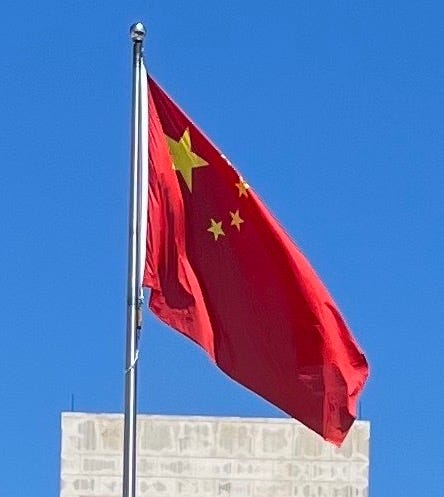China increases its use of power; uses Pelosi visit as a pretext
In response to U.S. Speaker of the House Nancy Pelosi’s visit to Taiwan, the Chinese conducted live fire exercises near Taiwan as a sign of protest.
While all the world understands that the U.S. has no intent to change its long-held one-China policy, China is using any invented incident to help speed up its intent to take control of Taiwan.
The U.S. policy is intentionally vague because at the same time the U.S. recognizes that Taiwan as part of the Peoples Republic of China (PRC), President Joe Biden also has recently vowed to defend Taiwan against any attack by the PRC.
“We agree with the One-China policy … But the idea that it can be taken by force - just taken by force - is just not appropriate.” Biden said. This statement reflected a subtle change in the U.S. official view.
In the past the U.S. officially took no stance on defending Taiwan despite weapons sales and military cooperation between the countries.
In a dramatic show of force, China wanted to demonstrate its improved military power and has conducted exercises that included rehearsing “the sinking of USS Ronald Reagan with hypersonic missiles near Taiwan.”
The Washington Post reported that the Taiwan Defense Ministry announced the Chinese have “fired missiles around Taiwan and sent almost 200 military aircraft and at least 40 warships to menace the island, according to Taiwan’s Defense Ministry.”
On August 8, China said that it decided to extend the length of the menacing exercises. The effect of the exercises has limited the use of the water ways and airspace near Taiwan. The Chinese have been careful so far to avoid Taiwan airspace or territorial waters.
President Xi is intent on protecting China against what he perceives as western attempts to limit him “politically, economically, socially, militarily and technologically.”
In addition to the live fire exercises, China announced it will discontinue cooperating with the U.S. in a number of ways.
China is pulling back cooperation on eight issues, “including defense, narcotics, transnational crime and climate change.” Beijing said Pelosi’s visit provided an “egregious provocation” resulting in the measures.
Consider that the visit by Pelosi did not change U.S. policy, no military action was taken, no economic sanctions were added, and no media campaign was undertaken by the U.S. government. The indignation on the part of the Chinese is self-induced.
This so-called egregious provocation is merely a fiction created by the Chinese Communist Party (CCP) for the purpose of accelerating China’s desire to replace the U.S. and its allies as the major diplomatic, military, and economic power in the region.
This phony outrage by CCP can easily be explained as an opportunity in keeping with its plan in the Great Rejuvenation of 2049 where it describes its long-range goal to overtake the U.S. in the region.
U.S. officials are now active in the region and must clearly articulate to friends and foes alike that the nation’s partnerships and allies are as strong as ever.
U.S. Deputy Secretary of State Wendy Sherman thought the current situation important enough that she stopped in to visit the small Pacific nation of Tonga to remind leaders there that they should decide its future, free of China’s undue influence. "It is strategic today as well because, as you know, the People's Republic of China wants to be here, they want to invest here," she said.
Secretary Antony Blinken, traveling in the Pacific and, attempting to buck-up worried allies, described the defense agreement with Philippines as “ironclad.”
This comes as China has attempted to exploit and manipulate countries in the region, and other regions, through direct diplomatic and economic actions, some behind the scenes, some more obvious, in countries such as the Solomon Islands, Sri Lanka, South Africa, Somalia, Afghanistan, Thailand etc… using country-specific measures.
China is also exercising economic power in the U.S. through its use of U.S. companies that are heavily reliant on China for manufacturing and distribution and more than willing to take actions that demonstrate their subordination.
One small example exemplifies China’s leverage over U.S. companies.
In a matter related to China’s effort to dominate a wide variety of sectors, U.S.-based Mars Wrigley, maker of Snickers, has gone to China on bended knee following merely mentioning Taiwan as a country in a regional ad.
The company said a “limited edition candy bar,” was only “in the "countries’ of South Korea, Malaysia, and Taiwan,” according to Reuters.
There is little doubt that Mars Wrigley reacted in response to behind-the-scenes pressure from Beijing.
The U.S. and its allies must completely wake up from the heavy doses of Chinese cash and realize that China is a menacing force not a mere competitor. It is imperative that the U.S. counters China now and abandon worries about whether leaders in the CCP become upset.
The U.S. best interests and that of most of the other countries in which China has meddled, must come first.
James Hutton is a former assistant secretary at the U.S. Department of Veterans Affairs and is a retired colonel in the U.S. Army. Follow him on Twitter @jehutton, GETTR @jehutton, and Truth Social @jehutton

